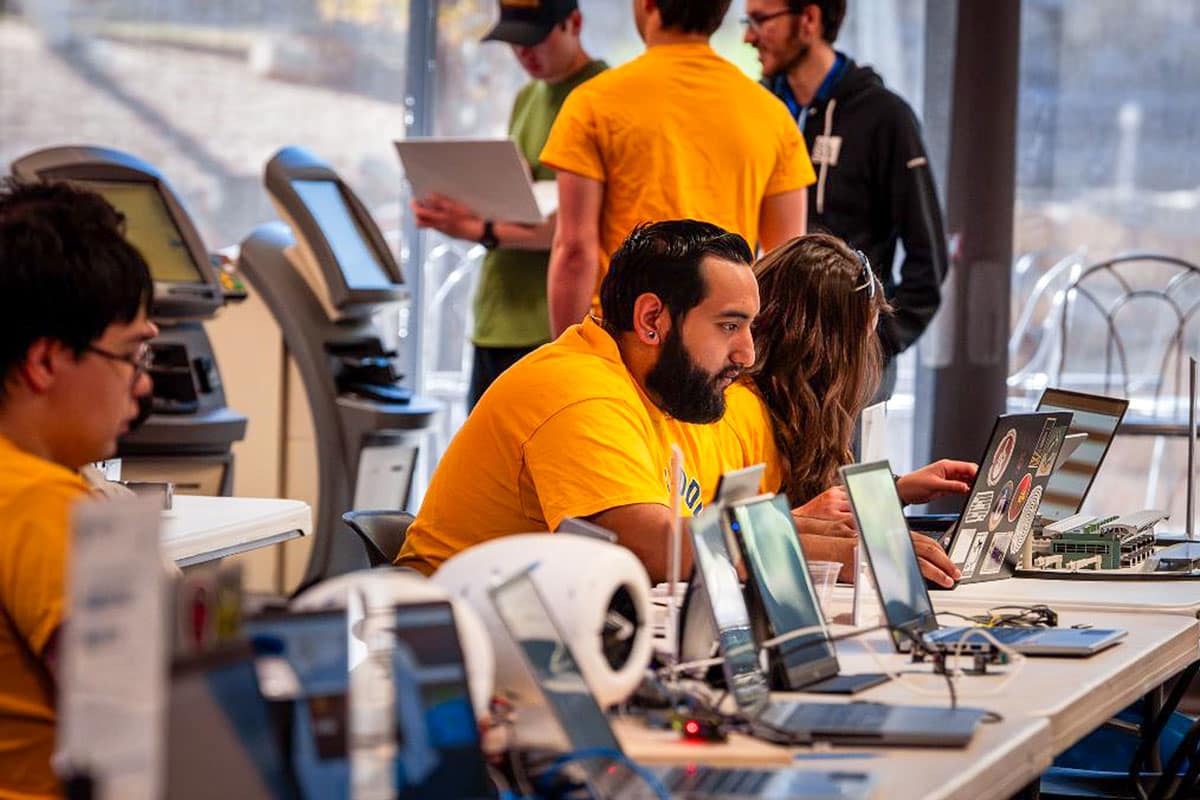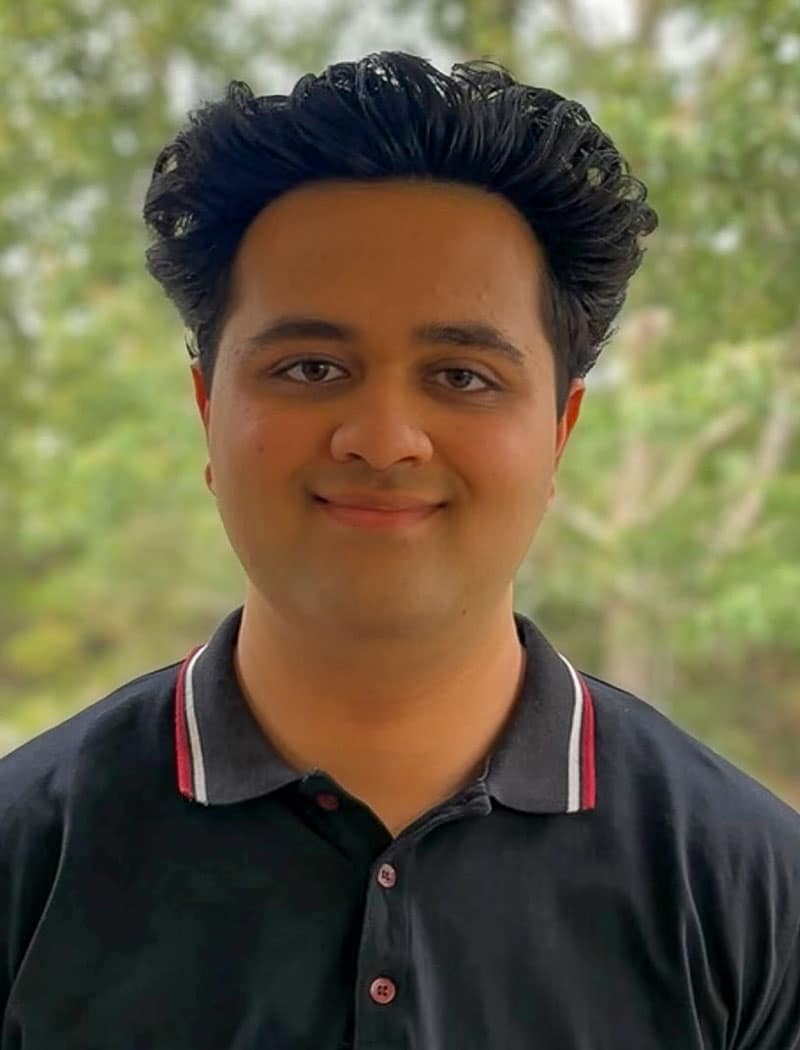Workshop, Competitions Strengthen Embry-Riddle Cybersecurity Expertise

For critical domains like aviation and space, the rising complexity of cyber threats is an ever-present concern. Students at Embry-Riddle Aeronautical University’s Daytona Beach and Prescott campuses are preparing for this future by participating in competitions and workshops that equip them for careers on the front lines of cybersecurity.
In April, Embry-Riddle’s Prescott Campus hosted the second ERAU-NSF-NASA Aerospace Cybersecurity Workshop, funded by the National Science Foundation’s Scholarship for Service (SFS) program. The annual event convened students, faculty and industry leaders to explore emerging challenges and identify solutions for securing the aerospace ecosystem.
Spanning two days, the workshop featured expert panels, student research presentations and a one-of-a-kind Capture-the-Flag (CTF) competition, which offered a platform for experiential learning and professional engagement.
“Our goal is to give students a real-world lens on cybersecurity in aerospace,” said Dr. Krishna Sampigethaya, chair of the Cyber Intelligence and Security Department and lead organizer. “Workshops like this bridge what students learn in classrooms with the urgent challenges and innovations professionals engage with in the field.”

Industry leaders, faculty and students explored emerging challenges and identified solutions for securing the aerospace ecosystem at the second ERAU-NSF-NASA Aerospace Cybersecurity Workshop, held on the Prescott Campus. (Photo: Embry-Riddle)
Among the ten panel discussions, a standout session on “Leadership Journeys in STEM and Aerospace Cybersecurity” featured an all-female lineup of student moderators and government, academia and industry experts, including leaders from Southwest Airlines, USC’s Information Sciences Institute, Pacific Northwest National Laboratory and Stellar Solutions. Their stories highlighted the importance of relationships, resilience and mentorship in advancing within technical careers.
“Follow your passion, but while you do that, give back to the community and build relationships,” said Janet Grondin, CEO of Stellar Solutions and an Embry-Riddle Prescott alumna. “This campus is far out ahead of anything else I’ve seen in cybersecurity education.”
The workshop’s CTF competition, hosted and designed by students on the Prescott Campus, challenged participants to defend a simulated airport under cyberattack. Competing teams from Embry-Riddle’s Daytona Beach Campus, Texas A&M University, Purdue University and the Polytechnic University of Puerto Rico tackled real-world cybersecurity scenarios. Daytona Beach teams took first and third place, while Texas A&M earned second.
“It was a lot harder than it was last year,” said Daytona Beach graduate student Caleb Hall, whose team won the event. “It takes a lot of time and effort. The ability to stick your head down and keep going, even when the going gets tough, takes diligence.”
Embry-Riddle Prescott graduate student Justin LaZare earned top recognition in the research poster session for his project, “CTIGPT: Teaching LLMs to Reason for Cyber Threat Intelligence with GraphRAG.” His work stood out among 20 posters from five universities.
The session also featured presentations from aerospace engineering students and students from non-cyber majors, showcasing the workshop’s interdisciplinary reach. The poster award was selected through a participant poll and judged by a panel of external experts from government, industry and academia.
Visiting professionals praised Embry-Riddle’s leadership in cybersecurity education and the workshop’s interdisciplinary approach.
“I’ve learned a lot about the community around cybersecurity,” reflected industry guest Matt Tomarchio of Deloitte & Touche. “The opportunity to hear from aviation leaders on what they’re doing in cyber is really inspiring. As we see more changes in the industry, from drones to flying cars or whatever comes next, it will be very important that these systems are secure.”
Preparing the Future Cybersecurity Workforce
For a full day earlier in the spring semester, two student teams based on the Daytona Beach Campus worked furiously to protect a fictional infrastructure system from attacks.
The attacks, led by a group of industry professionals posing as cyber criminals, challenged students to protect or reestablish a range of computer services. Much like the Aerospace Cybersecurity Workshop’s CTF, the scenario exposed future cybersecurity professionals to the threats they can expect to encounter in the workplace.
The infrastructure challenge was one component of the two-part National Centers of Academic Excellence in Cybersecurity (NCAE) Cyber Games, a rigorous competition that is only open to institutions designated as a National Center of Academic Excellence in Cyber Defense (NCAE-CD).

Two student teams from the Daytona Beach Campus competed in the National Centers of Academic Excellence in Cybersecurity Cyber Games this spring, with one team advancing to the national competition. (Photo: Embry-Riddle)
“If a service is down for 20 minutes, that’s 100 points you’re losing,” Tyler Lofton, a graduate-level Computer Science student, said of the hours-long competition.
Lofton and his teammates finished first in the Southeast 1 Regional, earning a place at the NCAE Cyber Games national competition on April 12, where they finished sixth. Both competitions required students to balance the infrastructure challenge with a CTF exercise that prompted them to solve cybersecurity puzzles to earn “flags.”
“Whatever they learn in class, they get a chance to actually practice in a real-world situation,” Dr. Laxima Niure Kandel said of the competition. Kandel, an assistant professor in the Department of Electrical Engineering and Computer Science, served as advisor for both Embry-Riddle teams.
For Sirio Jansen-Sanchez, a junior Electrical Engineering major, the competition has also had an impact on his Autonomous Maritime Robotics Association involvement.
“Even though it’s underwater robotics, the benefits between cybersecurity, robotics and mechanical engineering still apply,” he said.
Jansen-Sanchez and Lofton were joined by teammates Jackson Baker, Haskell Cappers, William Davis, Caleb Hall, Daniel Machado, Joshua Radjavitch, Drew Ridley and Serena Conticello in the regional and invitational rounds.
John Ferguson, Tiffany Flaherty, Kolton Galie, Sofia Guida, Luke Mauro, Botond Parkanyi, George Pozek, David Serfaty and Justin Villa also participated in the Southeast 1 Regional, where they finished sixth.
Combining Classroom Theory With Practical Know-How

Student Dev Patel finished third at the National Transportation Cybersecurity Competition. (Photo: Dev Patel)
For rising senior Dev Patel, cybersecurity competitions are a prime opportunity to combine theoretical classroom knowledge with the hands-on tasks he enjoys. Patel, who is earning a B.S. in Computer Science, won third place at the National Transportation Cybersecurity Competition (NTCC) this winter, further cementing both campuses’ legacy of competition success.
Offered by the University of Houston’s Transportation Cybersecurity Center for Advanced Research and Education, the competition tasked participants with completing virtual cybersecurity tasks in an environment that required both detailed solutions and speed.
“The competition required strong technical expertise and problem-solving skills,” Patel said. “I had to focus on tasks that represented real-world cybersecurity challenges,” he said, including password cracking, web vulnerability identification and basic system attacks.
Patel hopes to work for a cybersecurity firm after finishing his degree. He was the only one-person Eagle team to compete but was joined by three multi-person teams advised by Kandel and Dr. Omar Ochoa, associate professor and program coordinator for the M.S. in Computer Science and M.S. in Software Engineering.
Chris Allen, Jackson Baker, Haskell Cappers, Sofia Guida, Caleb Hall, Chelsea Klockenga, Tyler Lofton, Daniel Machado, Josh Radjavitch and Ryle Traub also competed.
